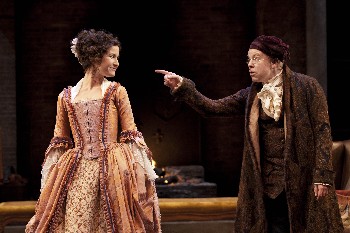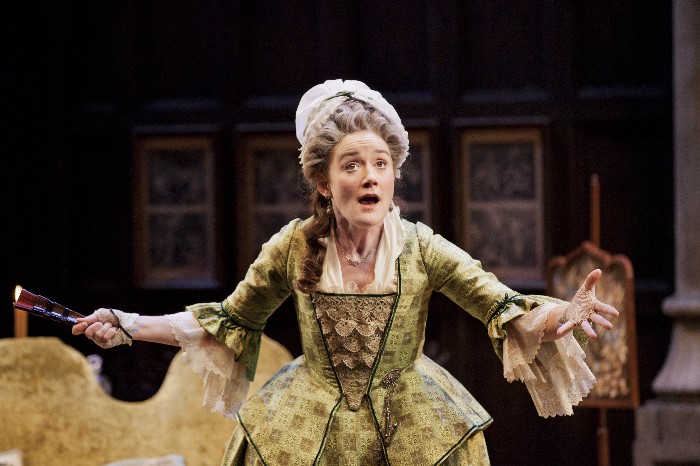Theater Review: An Amusing “She Stoops to Conquer” from the National Theatre
It is a pleasure to report that—driven by the lively direction of Jamie Lloyd and the skills of an energetic cast—the National Theatre production proves that even after two centuries, Oliver Goldsmith’s classic can still dole out plenty of comic delight.
She Stoops to Conquer by Oliver Goldsmith. Directed by Jamie Lloyd. Presented by The National Theatre in HD. Check on the NT Live site to find the locations for remaining screenings in New England throughout April. Screening at the Coolidge Corner Theatre, Brookline, MA, April 18, 7 p.m.
By Bill Marx

Katherine Kelly (Kate Hardcastle) and Steve Pemberton (Hardcastle) in the National Theatre’s “She Stoops to Conquer.” Photo: Johan Persson.
One reason I wanted to take in the National Theatre production of She Stoops to Conquer, Or, The Mistakes of a Night, broadcast via NT Live, is that after three decades of theater-going I’ve never had a chance to see Oliver Goldsmith’s classic, eighteenth-century comedy. Historically, the play, which was a hit when it premiered in 1773, serves as a link between the Restoration’s sardonic celebrations of desire and the sentimental laughs of today’s sitcoms. Goldsmith’s good friend, the critic Samuel Johnson, opined that he knew of “no comedy for many years that has so much exhilarated an audience, that has answered so much the great end of comedy—making an audience merry.” It is heartening to report that—driven by the lively (at times to the point of overkill) direction of Jamie Lloyd and the skills of an energetic cast—the National Theater production proves that after two centuries the play can still dole out plenty of comic delight.
Not that you don’t miss the steely fizz of the Restoration romps. The set-up of Goldsmith’s plot invites jabs at antique conceptions of class, snobbery, and sexual stereotypes, but the dramatist is content to steep his characters in embarrassment and misunderstandings—he protects them (and the audience) from any genuine revelations or shocks. The evening’s mayhem could be cleared up with one honest conversation. Two London bachelors, Hastings and Marlow, are tricked into believing a country house is an inn, treating Mr. Hardcastle, the increasingly irritated “landlord,” with the disdain reserved for the manager of a Motel Six that is not up to snuff. Politeness and dunderheaded reserve defeats elemental sanity.
Through this device, Goldsmith rings comic variations on the wages of snootiness high and low—the inescapably provincial Mrs Hardcastle dreams absurd dreams of upward social mobility while her wastrel son, Tony Lumpkin, impatiently awaits coming of age so he can receive his inheritance and happily drink his life away with the tavern riffraff. Daughter Kate decides to accept Marlow’s vision of her as an “available” barmaid once she learns that he has come to court her. It turns out that Marlow has a peculiar affliction when it comes to women—he is intimidated to the point of paralysis by “proper” ladies of his own class, but he is an aggressive companion to females on a lower social rung. Kate plays downmarket in order to catch her man, with the implication that middle class sensibility comes down to a fusion of sexual naughtiness and surface respectability. For Marlow, Kate will continue to “act” the barmaid in the bedroom and a lady in the rest of the house. Goldsmith was Irish; he saw the play-acting mechanics of English society but lacks the urge of his fellow countryman George Bernard Shaw to gum up the facile facades.

Delusions of Upward Mobility — Sophie Thompson as Mrs Hardcastle in “She Stoops to Conquer.” at the National Theatre. Photo: Johan Persson.
All of the script’s high-spirited hijinks are beautifully costumed and played out with vim and vigor on the lovely set of designer Mark Thompson. In an effort to make the material connect with audiences today, Lloyd has decided to ratchet up the script’s potential for farce, which for my taste cuts down on the play’s celebrated use of sentiment: the romance between Kate (Katherine Kelly) and Marlow (John Heffernan) comes off as thin to the vanishing point, while Mrs. Hardcastle (Sophie Thompson) is transformed into a monster of myopia. Thompson’s attempts to sound like the gentry—the character strangles her vowels to near-death—are highly amusing, but it defeats Goldsmith’s determination to view his characters with humanity. His figures should not be behavioral joke machines. In terms of self-consciousness, the performers’ winks at the audience about the omnipresent silliness is generally endearing (nothing like knowing the cast is having a good time), but when Lloyd has Lumpkin all but dry hump a woman in an effort to fool his mother the modernized jokiness turns sour, at least for me. Still, this is a boisterous staging that provides plenty of enjoyment—if only as an opportunity to see that such a heralded play still has legs.
Of course, the problem with seeing the performances in the NT Live presentation is that it is a televised version of a staging on the huge Olivier Theatre—the performers have to act and orate “big” in such a cavernous space, so the impression of over-the-top effusiveness probably comes from the camera being pushed too close to cast members having to play to the rafters. That said, the direction for the screen is generally smooth and savvy, though Ross MacGibbon, in an effort at times to take the focus off the leads and onto the supporting cast (playing servants and tavern mavens) indulges in ersatz-Eisenstein close-ups that don’t add much, aside from eye-filling glimpses of mugging. The challenge for NT Live continues to be how to fit the expansive action of the stage onto the screen without resorting to a cookie-cutter.
The extra-theatrical packaging of NT Live is still uneven. A short feature on the production’s costuming is of interest, but hostess Emma Freud strikes a hearty pose of enthused cultural salesperson that quickly becomes grating. And when she steps out of that role, the result can be ungainly: during an interview with Lloyd during the intermission, the director mentioned that Goldsmith died ill and penniless. Freud asks if the playwright died of the pox. Looking irritated, Lloyd responds that he doesn’t know. Cue a quick visit to Google . . .
The next season for NT Live has been announced, and it contains some promising productions—though for me the highlight will surely be a staging, directed by National Theatre honcho Nicholas Hytner, of one of my personal favorites among Shakespeare’s plays, the rarely produced Timon of Athens, a famously fragmented fable about a philanthropic man of wealth who, when he loses everything, finds to his chagrin that his friends will not repay his generosity. Misanthropy and fantasies of revenge result, no doubt to be memorably evoked by the marvelous Simon Russell Beale playing the title character. The financial meltdown in England, America, and elsewhere make the materialistic furies (which Shakespeare can barely contain) in this play timely messengers of disaster.
Bill Marx is the editor-in-chief of The Arts Fuse. For over three decades, he has written about arts and culture for print, broadcast, and online. He has regularly reviewed theater for National Public Radio Station WBUR and The Boston Globe. He created and edited WBUR Online Arts, a cultural webzine that in 2004 won an Online Journalism Award for Specialty Journalism. In 2007 he created The Arts Fuse, an online magazine dedicated to covering arts and culture in Boston and throughout New England.
